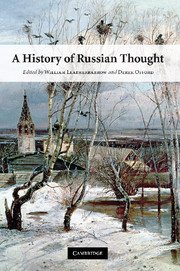Book contents
- Frontmatter
- Contents
- Preface
- List of contributors
- Dates, transliteration and other conventions
- Dates of reigns
- Russian titles of journals, newspapers and miscellanies
- PART I CONTEXT
- PART II INTELLECTUAL CURRENTS
- PART III THEMES AND CONSTRUCTS
- PART IV THE AFTERLIFE OF CLASSICAL THOUGHT
- 14 Continuities in the Soviet period
- 15 Dialectical materialism and Soviet science in the 1920s and 1930s
- 16 Afterword
- Biographical details of thinkers and writers
- Selected bibliography
- Index
14 - Continuities in the Soviet period
Published online by Cambridge University Press: 05 June 2012
- Frontmatter
- Contents
- Preface
- List of contributors
- Dates, transliteration and other conventions
- Dates of reigns
- Russian titles of journals, newspapers and miscellanies
- PART I CONTEXT
- PART II INTELLECTUAL CURRENTS
- PART III THEMES AND CONSTRUCTS
- PART IV THE AFTERLIFE OF CLASSICAL THOUGHT
- 14 Continuities in the Soviet period
- 15 Dialectical materialism and Soviet science in the 1920s and 1930s
- 16 Afterword
- Biographical details of thinkers and writers
- Selected bibliography
- Index
Summary
Intellectual history presents a bundle of continuities and discontinuities enacted, sometimes simultaneously, within cultures that evolve over time. In this essay I focus on the continuities that permeate – often hidden behind dramatic political changes – the scene of philosophy and social thought in the Soviet period, from the October Revolution in 1917 to the demise of the USSR in 1991. Limitations of space mean that difficult decisions have had to be made as to what ought to be included and what could be left out. Since the dominant intellectual paradigm of the period was Marxism, it was beyond doubt that any serious engagement with the question of continuity must not simply address Marxism but should actually put it right at the centre of attention. Ignoring Marxism and preferring instead to explore solely various non-Marxist discourses would have resulted in a failure to grasp the crucial place of Marxism in the often subterraneous dynamics of stability and change which sustained and shot through the public discourses of philosophy and the social sciences in the Soviet period. With reference to Marxism, the continuity inscribed in this dialectic of permanence and transformation had two important aspects: the self-awareness and positioning of Soviet Marxism vis-à-vis western non-Marxist philosophy, and through this, but also independently of it, vis-à-vis pre-1917 Russian thought.
The second part of the essay examines various discourses of exceptionalism, concentrating on the revival of Slavophilism, pochvennichestvo (a current of thought that crystallised in the 1860s and displayed some affinities with Slavophilism but was more unambiguously conservative and at times also anti-Semitic) and Eurasianism.
- Type
- Chapter
- Information
- A History of Russian Thought , pp. 311 - 339Publisher: Cambridge University PressPrint publication year: 2010
- 1
- Cited by



